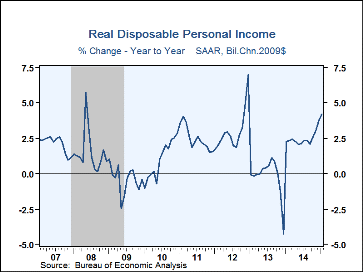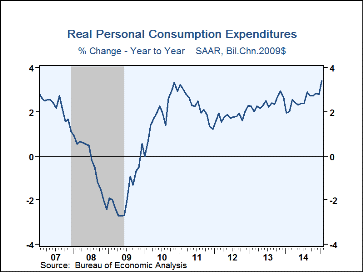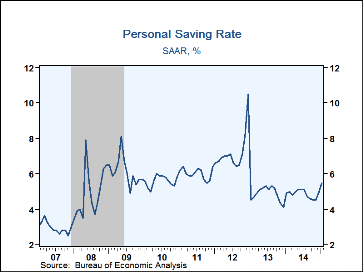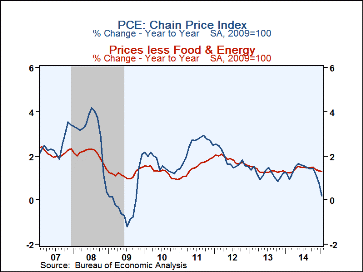 Global| Mar 02 2015
Global| Mar 02 2015U.S. Personal Income Increase Continues to Outpace Spending
by:Tom Moeller
|in:Economy in Brief
Summary
Personal income rose an expected 0.3% during January (4.6% y/y) following an unrevised 0.3% December increase. The expectations figure is from the Consensus Economics Forecast Survey. Wages & salaries strengthened 0.6% (4.9% y/y) [...]
Personal income rose an expected 0.3% during January (4.6% y/y) following an unrevised 0.3% December increase. The expectations figure is from the Consensus Economics Forecast Survey. Wages & salaries strengthened 0.6% (4.9% y/y) following a 0.1% uptick. Transfer payments surged 1.0% (5.9% y/y) as Medicaid payments strengthened 1.1% (11.8% y/y). These gains were offset by a 0.9% decline (+3.7% y/y) in proprietors income but rental income increased 0.3% (7.2% y/y). Dividend income ticked 0.1% higher (8.6% y/y) with improved corporate profitability. Interest income declined 0.5% and fell 1.0% y/y with lower interest rates.
Personal consumption expenditures declined 0.2% (+3.6% y/y) following an unrevised 0.3% decline. Personal spending has fallen at a 0.1% annual rate during the last three months. The latest decline outpaced expectations for a 0.1% slip. The PCE chain price index fell 0.5% (+0.2% y/y) following two months of 0.2% decline. As a result, the y/y gain of 0.2% was the weakest since October 2009.
Real disposable income increased 0.9% (4.2% y/y) following two months of 0.5% rise. Real personal spending gained 0.3% (3.4% y/y) after a 0.1% slip.
In constant dollars, motor vehicles and parts purchases fell 0.2% last month (+10.6% y/y) following a 3.1% December drop. Furnishings & appliance spending improved 0.3% (9.2% y/y) after a 0.7% rise. Recreational goods & vehicles purchases improved 0.2%, but by an outsized 12.9% y/y. Apparel purchases countered some of this strength with a 0.6% drop (4.7% y/y) after a 0.8% decline. Real services purchases increased 0.4% (2.5% y/y) after a 0.1% uptick. Spending on restaurants and hotels remained strong and posted a 0.3% rise (6.2% y/y) after a 1.2% jump.
The strength in income accompanied by the weakness in spending lifted the personal savings rate to 5.5%, the highest level since December 2012. Personal saving rose 18.0% during the last twelve months.
The 0.5% decline in the chain price index reflected a 10.4% drop (-21.2% y/y) in energy prices while food prices edged 0.2% lower (+2.7% y/y). Durable goods prices were off 0.3% (-2.8% y/y) and nondurable goods prices fell 2.3% (-3.7% y/y) with lower gasoline costs. Services prices ticked 0.1% higher (2.0% y/y) for the second straight month. The price index excluding food & energy edged up 0.1% m/m (1.3% y/y) following no change.
The personal income & consumption figures are available in Haver's USECON database with detail in the USNA database. The consensus expectation figures are in the AS1REPNA database.
| Personal Income & Outlays (%) | Jan | Dec | Nov | Y/Y | 2014 | 2013 | 2012 |
|---|---|---|---|---|---|---|---|
| Personal Income | 0.3 | 0.3 | 0.4 | 4.6 | 4.0 | 2.0 | 5.2 |
| Wages & Salaries | 0.6 | 0.1 | 0.8 | 4.9 | 4.5 | 2.8 | 4.5 |
| Disposable Personal Income | 0.4 | 0.3 | 0.3 | 4.4 | 3.9 | 1.0 | 4.9 |
| Personal Consumption Expenditures | -0.2 | -0.3 | 0.4 | 3.6 | 3.9 | 3.6 | 3.7 |
| Personal Saving Rate | 5.5 | 5.0 | 4.5 | 4.9 (Jan '14) |
4.9 | 4.9 | 7.2 |
| PCE Chain Price Index | -0.5 | -0.2 | -0.2 | 0.2 | 1.3 | 1.2 | 1.8 |
| Less Food & Energy | 0.1 | 0.0 | 0.1 | 1.3 | 1.4 | 1.3 | 1.8 |
| Real Disposable Income | 0.9 | 0.5 | 0.5 | 4.2 | 2.5 | -0.2 | 3.0 |
| Real Personal Consumption Expenditures | 0.3 | -0.1 | 0.6 | 3.4 | 2.5 | 2.4 | 1.8 |
Tom Moeller
AuthorMore in Author Profile »Prior to joining Haver Analytics in 2000, Mr. Moeller worked as the Economist at Chancellor Capital Management from 1985 to 1999. There, he developed comprehensive economic forecasts and interpreted economic data for equity and fixed income portfolio managers. Also at Chancellor, Mr. Moeller worked as an equity analyst and was responsible for researching and rating companies in the economically sensitive automobile and housing industries for investment in Chancellor’s equity portfolio. Prior to joining Chancellor, Mr. Moeller was an Economist at Citibank from 1979 to 1984. He also analyzed pricing behavior in the metals industry for the Council on Wage and Price Stability in Washington, D.C. In 1999, Mr. Moeller received the award for most accurate forecast from the Forecasters' Club of New York. From 1990 to 1992 he was President of the New York Association for Business Economists. Mr. Moeller earned an M.B.A. in Finance from Fordham University, where he graduated in 1987. He holds a Bachelor of Arts in Economics from George Washington University.
More Economy in Brief
 Global| Feb 05 2026
Global| Feb 05 2026Charts of the Week: Balanced Policy, Resilient Data and AI Narratives
by:Andrew Cates










